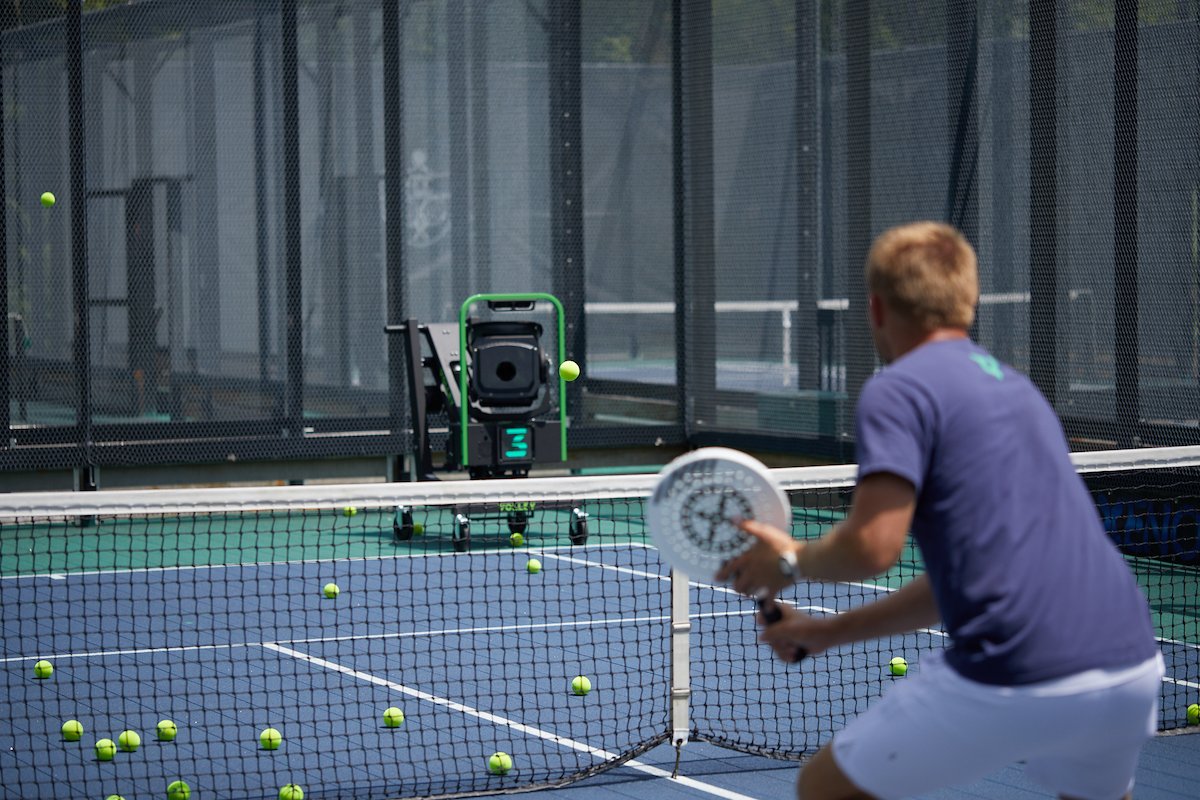A team of innovative minds has come together to create a new sports tech startup, Volley. This company has one goal in mind: to revolutionize the way racquet sports players (platform tennis, padel, and pickleball) train. And they’re doing it with the help of their AI-enabled sports training machine.
Unlike traditional tennis ball machines, Volley’s trainer robot does more than just launch balls at varying speeds and heights. With the use of AI and vision software, the trainer collects data as you play, learns your skill level, and simulates live gameplay. This eliminates the need for a full team during training sessions.
“Volley is a great machine for the pros, the beginners, and everyone in between because of the AI and the smarts of the system,” explains co-founder and CEO John Weinlader to TechCrunch. “It understands the game, where you are on the court, and responds as if they were a real opponent. So, you are playing at a level that you would in a real game.”
But that’s not all. Volley also has three cameras built into the device for different purposes such as person and ball tracking and video recording. And for those maintenance issues, there’s a camera inside the machine that allows customer support to virtually troubleshoot and guide you through any problems.
One stand-out feature of this machine is the speaker and LED screen, which allows instructors to guide an entire group through workouts. Its adjustable height, set at 87 inches, can also tilt 56 degrees up and 38 degrees down and rotate 34 degrees left or right, providing a wide range of shot angles.
Volley also offers a mobile app for iOS and Android devices, giving you access to customized drills, footage to review your footwork, player stats, and more. You can even digitally control the machine by tapping on your phone to select where you want the ball to land. Plus, all of the data collected is stored so that when you come back to the club, you can pick up where you left off.
So far, Volley has had 1,007 app installs and is constantly adding new features. Recently, they introduced a side-by-side video comparison feature to the app, allowing players to see the differences in their form. And at the upcoming RacquetX Conference, they will be showcasing their new hand gestures feature, which allows you to control the trainer without a mobile device.
Volley’s trainers were released in September 2023 and quickly sold out in less than four months. With 110 trainers already distributed to 45 platform tennis and Padel clubs across the U.S., including Connecticut, Florida, Illinois, Massachusetts, Maryland, New Jersey, Ohio, and Pennsylvania, it’s clear that there is a demand for this next-generation technology.

“We have proven there is demand for our next-generation technology that simulates live play on the court. Other sports solutions, like the golf simulator, have provided people better access to work on their game; this is what Volley delivers for racquet sports,” says Weinlader.
The company charges each club a leasing fee of $1,500 to $3,000 per month, depending on the number of trainers and features used and members served.
Volley is currently in the process of deploying its second round of trainers and was founded by two brothers, John and Dan Weinlader. With backgrounds in engineering, the two previously built an AgriTech business for John Deer.
John, who is also an avid platform tennis player, came up with the idea for Volley while experimenting with a tennis ball machine and painter sticks to mimic certain shots.
“With racquet sports, the only way to improve is to go to the court and play with three other players or a pro – and that didn’t necessarily guarantee you would be able to work on the shots that were most challenging for you. I grew really frustrated with the lack of options and finally decided to take matters into my own hands,” John shares.
After three years and eight prototypes, the company developed the trainer that is now on the market.
The racquet sports space has seen quite a bit of tech innovation in recent years, from Slinger’s portable ball launcher and accompanying app to Proton’s smart ball machine with internal sensors and Swing Vision’s phone mount for recording and analyzing shots. However, Volley believes it has no immediate competitors as it combines video recording and ball dispensing in one device and uses an AI-driven approach to simulate live play on the court.
“Volley is in a category of its own because the ball trainers of yesterday are no longer meeting the needs of players and pros. We see ourselves as the next-generation solution – just like golf simulators are innovating golfer training,” explains John.
The company has big plans for the future, including leasing trainers to individual players with at-home courts and expanding their reach through partnerships like their recent one with the American Platform Tennis Association (APTA). And while they are currently self-funded, they are in the process of raising a $4 million Series A round, expected to close in mid-April.
With such a groundbreaking and in-demand product, it’s no surprise that Volley is making waves in the racquet sports industry. And as they continue to innovate and fine-tune their technology, they are well on their way to becoming the go-to solution for players looking to up their game.








